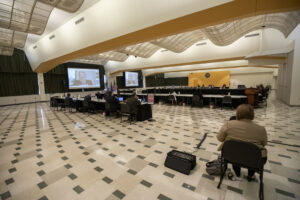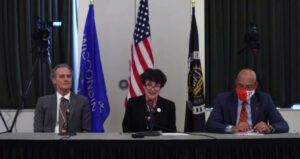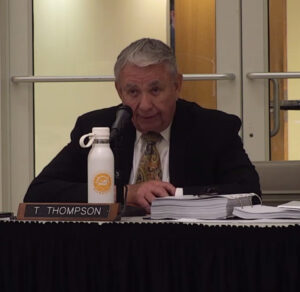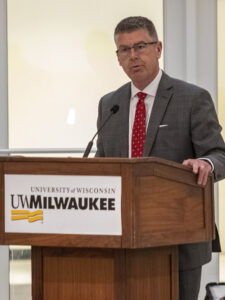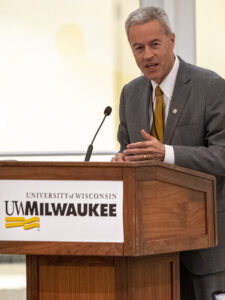MILWAUKEE, Wis. – Returning to pre-pandemic campus life in Fall 2021 is a top priority around the University of Wisconsin System, and three chancellors spoke up today about how they’re planning to make it happen.
Addressing the Board of Regents, UW-La Crosse Chancellor Joe Gow said an email from the parent of a UWL freshman was particularly memorable in highlighting the pandemic’s human impact. Her daughter, the mother wrote, hadn’t met any of the students in her class and didn’t feel like she’d made any relationships.
“It was a very potent reminder of the importance of out-of-class experiences,” said Gow, vowing things will be different this fall. “It’s a reminder of why people come to a university like ours.”
Chancellors across the System are aiming for a fall semester that features in-person classes and face-to-face experiences on campus, from residence halls and dining halls to athletics, concerts, and social gatherings.
UW-Parkside Chancellor Debbie Ford said regrouping for the fall semester includes everything from reopening offices on campus to moving furniture to resuming campus tours and rehiring student workers. “Our campus this fall will look more like the fall of 2019,” she predicted. “I am looking forward to fall 2021. It’s been way too quiet.”
UW-Platteville Chancellor Dennis Shields saluted the extraordinary commitment of faculty and staff in successfully getting through a trying year. “When the time came to stand up and make sure we could have classes this year and our campuses open, it was done under duress, with furloughs, and without complaint,” he said.
Gow noted that his campus experienced a surge in positivity rates early last fall, but quickly pivoted to implement a two-week quarantine to mitigate spread. “I have never seen that kind of collaboration,” he said. “We were making decisions constantly that were very high stakes and had to be made quickly. It was very inspiring and instructive for the future.”
Ford acknowledged her faculty and staff have been living in a pressure cooker for 15 months. “I’ve directed the team to take time to reflect, recharge, and renew,” she said. ‘We need to make time and space and give grace as we focus on building back the communities that make the UW so special.”
Regent Ashok Rai urged colleagues to keep in mind the lingering issues resulting from the pandemic. “We keep using the word ‘normal,’” Rai said. “It’s a good goal, but for the incoming freshman class, the amount of trauma they’ve faced mean it’s probably the least prepared freshman class we’ve ever seen, especially the mental health issues and especially with our black and brown populations. We need to be prepared for that.”
Chancellors noted expanded summer bridge programs and mental health services to help support students.
UW System President Tommy Thompson said the three presenting chancellors were emblematic of all UW chancellors. “I could tell stories about each of these leaders who’ve done outstanding jobs,” he said. “We have real champs as chancellors.”
UW System President’s Report
After a year of pushing aggressive COVID-19 testing protocols on all campuses to keep infection rates low, President Tommy Thompson told Regents the cornerstone of efforts now is to get as many people as possible fully vaccinated.
“While the UW System will not mandate that members of our campus communities be vaccinated, we will continue to mount an aggressive campaign to convince people that vaccination is the most effective tool we have to get to where we want to be,” Thompson said. “Our priority now is planning for a full, in-person university experience this fall.”
Thompson noted that UW System has vaccination clinics at 11 campus locations around the state, and that the UW has administered more than 225,000 vaccinations to date. One in 20 vaccinations administered in Wisconsin overall has been administered at a UW site.
He told Regents that 1,042 students have signed up for duty so far under UW System’s nursing initiative, which gives participants a $500 tuition rebate for their service. He noted that this initiative was recently extended through the summer.
Turning to a legislative update, Thompson said he is encouraged by the recommendations recently forwarded by the Joint Committee on Finance (JFC) regarding the UW System’s 2021-2023 budget request, but he will continue to strongly advocate for additional UW System initiatives.
A key takeaway of the JFC hearing was the proposed lifting of the UW System tuition freeze, returning tuition-setting authority to the Board of Regents.
“This is an incredibly important step, one that restores power and accountability to the UW System,” Thompson said.
Thompson also noted that the JFC ended UW System’s $45-million annual lapse going forward. “UW System is one of the only state entities for which the Committee did not make the FY21 lapse a permanent cut to base funding,” he said.
Thompson said JFC will take up the UW System’s capital budget request as early as next week and will address the compensation plan later in the budget process.
“I will be relentless in advocating on behalf of the University of Wisconsin System,” Thompson said. “I have long believed there is no better investment for the state of Wisconsin than the UW System.”
Regent President’s Report
In his final report to the Board, outgoing Regents President Andrew S. Petersen said he has been continually impressed at how the UW campus communities responded to the unprecedented public health crisis over the past year. “Our campus and System leadership, our faculty and staff, and most particularly our students stepped up in magnificent fashion,” he said.
Looking back, Petersen told Regents he’s particularly proud of the increased attention to the issues of diversity, equity, and inclusion by the Board and the UW System. In addition to hiring last year a System-level officer devoted to these issues, he pointed to the new Regents Opportunity Scholarships, which target underrepresented and underserved students. The Board committed to providing $1 million annually for these scholarships.
Petersen said the UW System is also steadily increasing its profile and standing through efforts like the All in Wisconsin campaign, which has sought to make closer connections between the businesses, communities, and people of Wisconsin and their public university.
“The UW System is being seen and heard,” Petersen said. “Enhancing our profile and credibility, I believe, is fundamental to our long-term success.”
Turning to budget negotiations, Petersen said he is pleased the legislature plans to restore tuition-setting authority to Regents and to end UW System’s $45-million annual lapse. “If these recommendations proceed, they are huge steps forward for UW System,” he said.
He thanked Chancellors for their tireless efforts. “Your service to the State of Wisconsin is unrivaled and so appreciated,” Petersen said. He also noted his appreciation for the support of UW System Administration and the collegiality and continuing commitment of fellow Regents to putting performance over politics.
“At the end of the day, our ‘north star’ will always be what’s best for the University of Wisconsin System and the people of Wisconsin,” Petersen said.
Mone calls for investment in UW-Milwaukee
In his host campus presentation, “The Impact and Relevance of an Engaged Top-Tier Research University,” UW-Milwaukee Chancellor Mark Mone reiterated the message that an investment in UW-Milwaukee is an investment in Wisconsin.
“We’re linked. And we make a difference,” Mone told Regents. “We have a unique responsibility in the state. And we own it. We’re the largest economic hub in the state, and we hope we have shown that we respond innovatively and put a lot of effort into solving the issues that face us.”
Mone added that the Milwaukee area is also home to significant and historic socio-economic challenges, and UWM has a major role to help lift minority populations to greater opportunities.
With 5,400 graduates annually and the most diverse student population in the UW System, Mone said UW-Milwaukee is helping to address workforce demands in four key areas: health and human services, business, computer science, and engineering/science.
He emphasized that it’s important legislators understand that the benefits to the state and community of having an educated populace exceed the benefits to individual graduates.
Mone said to address challenges and seize opportunities requires carefully, cultivated partnerships; focused, intentional resource allocations and sustained commitment; and devoted, committed leaders.
“What we want to do is address and fix problems,” Mone said.
UW-Milwaukee presents annual Athletics Report
UW-Milwaukee Athletic Director Amanda Braun provided an overview of academic, fiscal and compliance matters in the UWM athletics program.
Braun told Regents the past year was highly successful for Panther student athletes despite a quiet fall in which COVID-19 forced the cancellation of all sports.
“We had our best competitive year in seven years,” Braun said. “The incredible resilience of our student athletes and coaches with the constant testing and quarantining, it was lot to deal with and they came through with flying colors.”
She noted that UWM sponsors 15 varsity sports, providing approximately 300 student-athletes with the opportunity to participate in college athletics.
During the 2020-21 season, UWM earned four Horizon League titles, with the women’s basketball, women’s cross country, and women’s and men’s soccer teams bringing home championship trophies.
UWM’s student athletes also scored well academically, Braun said, and have now tallied 41 consecutive semesters with at least a 3.0 GPA. She also noted the current graduation rate for student athletes is 84%, well above the percentage for the general student population.
The Athletics program benefits the campus overall, Braun said, by boosting student enrollment, campus community and alumni engagement, brand loyalty and visibility, and fundraising and corporate support.
Regents welcome new colleagues
Two new Regents were welcomed to the Board: Dr. Ashok Rai of Green Bay and Brianna Tucker of Milwaukee.
“UWM truly forged the person before you,” said Rai, who earned his undergraduate degree at UWM. “The service I hope to provide (as a Regent) will only be a fraction of paying back what the UW System has done for me.”
Rai is President and Chief Executive Officer of Prevea Health, a physician-led healthcare provider in the Green Bay area.
Tucker is a student at UW-Stevens Point, double-majoring in Political Science and Spanish, with a minor in Criminal Justice. “We’re back in my homeland here now in Milwaukee, and I am excited to work with all of you,” Tucker said.
Business & Finance Committee
Alex Roe, UW System Senior Associate Vice President for Capital Planning and Budget, provided Regents with an informational briefing on real estate advisory services. Roe told Regents that following issuance of a request for proposals, review and evaluation, and subsequent contract execution, six firms were chosen to compose a stable of advisors to assist UW institutions that have identified a real estate opportunity.
Roe said the proposed advisory services have been broken down into three phases: (1) identification of a development opportunity and market feasibility; (2) development of a solicitation to select a real estate developer who can develop the identified project and assist in evaluating financial aspects of the project; and (3) recommendation of an ownership model and assist in negotiating partnership agreements.
Once an institution has identified a real estate opportunity, the institution will work with Capital Planning & Budget to develop a scope of work and select an advisor to work with.
“We have already had multiple conversations with campuses about projects they might want to pursue,” Roe said.
She reiterated that any project that exceeds the $1 million limit established in Regent policy will be brought before the Board for consideration and approval.
In other business, the Business & Finance Committee:
- Heard a host campus presentation by Robin Van Harpen, UW-Milwaukee Vice Chancellor for Finance & Administrative Affairs, “UWM’s Financial and Administrative Outlook: Meeting Wisconsin’s Needs into the Future;”
- Approved an amendment to an existing consulting agreement between UW-Madison and Welch Allyn, Inc., a medical device company known for ocular examination devices such as ophthalmoscopes and retinal imaging cameras. Under this agreement, the UW Fundus Photograph Reading Center will assist in a study evaluating the accuracy of an artificial intelligence software in detecting referable diabetic retinopathy;
- Approved an amendment to an existing agreement between UW-Madison and Perspectum Diagnostics, Ltd., a medical imaging company that delivers digital technologies to help clinicians provide care for patients with liver disease. Under this fee-for-service arrangement, the Department of Radiology’s Medical Image Research Support will provide analysis of de-identified Magnetic Resonance Elastography (MRE) data sets provided by Perspectum;
- Approved a master research agreement between UW-Madison and Canon Medical Systems USA, Inc., a California corporation that provides medical imaging systems. Canon seeks to engage in various research efforts with the Departments of Radiology and Medical Physics at the School of Medicine and Public Health that will focus on developing innovative methods for conducting image-guided, minimally invasive surgical interventions in a wide-bore computed tomography (CT) scanner;
- Approved a fee-for-service agreement between UW-Madison and Cynata Therapeutics, Ltd., an Australian stem cell and regenerative medicine company that is developing a therapeutic stem cell platform technology using discoveries made at UW-Madison. Cynata uses induced pluripotent stem cells derived from cells obtained from an adult human donor, not embryonic stem cells, as a starting material in its manufacturing process. Under the agreement, Waisman Biomanufacturing will provide contract manufacturing services for a cell therapy product that is being evaluated to treat various diseases including COVID-19, graft vs. host disease, and osteoarthritis;
- Approved an enterprise contract between UW System and Zoom Video Communications, Inc. for web conferencing services. This agreement will allow consolidation of existing stand-alone contracts across the UW institutions and is estimated to save over $340,000 per year in recurring costs and over $1.1 million during the initial contract term, while increasing efficiency by standardizing the toolset across institutions; and
- Heard the Trust Funds Quarterly Investment report for the period ending March 31, 2021. As of that date, UW System Trust Funds assets totaled $689.9 million, comprised of $540.5 million in the Long Term (endowment) Fund and $149.4 million in the Income Cash Fund. The Fund’s public equity investments increased 5.30% during the quarter, while the bond investments returned -4.27% and the inflation sensitive investments returned -0.38%. For the quarter, the Long Term Fund increased in value 1.99% (before fees), while the UW Fund Custom Benchmark increased 1.95%. The Income Cash Fund gained 0.02% for the period.
Education Committee
The Education Committee held the first required reading of UW-Whitewater’s revised mission statement, which has previously been approved by shared governance bodies at the university as well as by the Provost and Chancellor.
The new mission statement defines the various student populations that UW-Whitewater serves, lists the levels of academic programs offered and areas of academic programming. The revised mission statement highlights the long-standing mission of the institution to serve students with disabilities and underscores the UW-Whitewater’s commitment to access and to being an inclusive community.
UW-Whitewater will now hold a public hearing on the mission statement to solicit community feedback before the revised mission statement comes back to the Board for final review.
In other business, the Education Committee:
- Approved UW-Eau Claire’s request for a Bachelor of Business Administration in Entrepreneurship. The program will replace the existing Entrepreneurship emphasis at UW-Eau Claire. Program graduates will be prepared to start their own business or secure employment in a growth-oriented industry with entrepreneur/intrapreneur environments where they can contribute a repertoire of venture management skills;
- Approved UW-Eau Claire’s request for a Bachelor of Business Administration in Human Resource Management. The program will replace the existing Human Resource Management emphasis at UW-Eau Claire. The capstone requirement for the B.B.A. in Human Resource Management culminates in a passing score on the Society for Human Resource Management Certification Exam (SHRM-CP);
- Approved UW-Eau Claire’s request for a Bachelor of Business Administration in Operations and Supply Chain Management. The program will replace the existing Operations and Supply Chain emphasis. The capstone requirement for the B.B.A. in Operations and Supply Chain Management culminates in a passing score on the external APICS Certified in Planning and Inventory Management (CPIM) exam;
- Approved UW-Madison’s request for a Master of Science (M.S.) in Sports Leadership in the Department of Educational Leadership and Policy Analysis in the School of Education. Key areas for sports leadership include athletic administration, coaching, justice in sport, and sports psychology. The coursework is fully online. The M.S. in Sports Leadership will bring UW-Madison into parity with other Big Ten institutions that already provide sports leadership programming;
- Approved UW-Milwaukee’s request for a Bachelor of Business Administration in General Business. At the bachelor’s level, the Lubar School of Business currently offers six majors. The addition of the B.B.A. in Business: General Business will allow students to gain a broad level of expertise and acquire a business degree without having to focus in any one specific business area, as provided by the other majors;
- Approved UW-Milwaukee’s request for a Bachelor of Science in Neuroscience, which will respond to occupational and research growth in the field of neuroscience and the corresponding increase in undergraduate demand for a coherent neuroscience major integrating the necessary interdisciplinary courses. The curriculum allows sufficient flexibility in elective coursework to permit specialization in the field, including neuroscience subdisciplines such as cognitive, cellular and molecular, or computational;
- Approved UW Oshkosh’s request for a Bachelor of Science in Strength and Conditioning, which will replace the current Strength and Conditioning emphasis in the Kinesiology major. This proposal is driven by the fact that the National Strength and Conditioning Association (NSCA) will require candidates for the Certified Strength and Conditioning exam to be prepared by an educationally accredited program;
- Approved a request to the trustees of the William F. Vilas Trust Estate for $6,811,066 for fiscal year 2021-22. These funds support student scholarships, student fellowships, academic programs, Vilas Research Professorships, and Vilas Distinguished Achievement Professorships at both UW-Madison and UW-Milwaukee in Biological Sciences, Physical Sciences, Social Sciences, Arts and Humanities, and Music;
- Approved the annual report on tenure designations, promotions, and new tenured appointments made at the 13 UW institutions. Pursuant to s. UWS 3.06, Wis. Admin. Code, the criteria and procedures for promotion and the granting of tenure are established by each institution, and must include an evaluation of teaching, research, and professional and public service contributions to the institution;
- Heard a report on the assignment of the Office of Educational Opportunity (OEO) within the Office of Academic and Student Affairs and how it will support future innovation. OEO Director Vanessa Moran shared updates on authorized schools and revised standard operating procedures and practices. Bob Soldner, Assistant State Superintendent at the Wisconsin Department of Public Instruction, presented information related to charter school funding;
- Heard a UW-Milwaukee presentation, “Students at the Center, Planning for a Radically Welcoming Campus,” which highlighted the student-focused components of the University’s 2030 campus planning initiative. Student-centric initiatives include the Moonshot for Equity regional consortium, general education reform, reducing financial barriers for students in need, and wrap-around student support services;
- Heard an update on planning for the Freshwater Collaborative of Wisconsin, presented by Executive Director Marissa Jablonski; and
- Heard an update from Anny Morrobel-Sosa, Vice President for Academic and Student Affairs, on UW System presidential initiatives including Prison Education and Expanding Online Learning.
Audit Committee
As part of her Fiscal 2021 Audit Plan report, Chief Audit Executive Lori Stortz told Regents that heightened attention to cybersecurity remains a high priority for UW System. Identifying incidents early and responding quickly is critical, she said. Stortz noted that the overall results of their audit in this area have been “very, very good.”
In other business, the Audit Committee:
- Approved the Fiscal Year 2022 Audit Plan;
- Heard the Office of Internal Audit’s independence statement;
- Heard a report from Youth Protection and Compliance Administrator Prenicia Clifton and Chief Compliance Officer Katie Ignatowski on precollege and youth protection efforts;
- Heard an update from Associate Vice President Katherine Mayer on information security. Angela Ryan, Director of Risk Management, also provided an update on internal controls and enterprise risk management; and
- Heard an update from Title IX and Clery Administrator Sarah E. Harebo on revisions to Regent Policy Document 14-2, Sexual Violence and Sexual Harassment.
Capital Planning & Budget Committee
Providing an update on recent Building Commission action, UW System Senior Associate Vice President Alex Roe told Regents the Commission is particularly attentive to project costs, given the recent spike in lumber costs as well as rising steel and concrete costs.
“We are not unusual. This is going on throughout the country,” Roe said. “Our institutions are working closely to stay within budgets.”
Roe also told Regents that the UW System’s capital budget request for 2021-2023 could go before the Joint Committee on Finance next week.
In other business, the Capital Planning & Budget Committee:
- Heard a report from Alex Roe, UW System Senior Associate Vice President for Capital Planning and Budget, on real estate advisory services;
- Heard a Semi-Annual Status Report on Leasing Activity since December 1, 2020;
- Heard a Semi-Annual Status Report on UW Solely Managed Capital Projects now underway at UW System institutions; and
- Heard UW-Milwaukee’s presentation, “UWM’s Capital Outlook: Meeting Wisconsin’s Needs into the Future.” The presentation described UW-Milwaukee’s space deficiencies and how it plans to address its critical capital needs to meet the needs of its students.
Research, Economic Development & Innovation Committee
UW-Milwaukee Chancellor Mark Mone and UWM Senior Executive Director of Strategic Partnerships Jennifer Abele led the presentation, “Future-Focused Research and Industry Partnerships Drive Innovation and Economic Competitiveness.” They provided an overview of the UWM’s Office of Strategic Partnerships including its vision, value proposition, and results to-date. They also highlighted three key initiatives: the Northwestern Mutual Data Science Institute, the Higher Education Regional Alliance (HERA), and TechEd Frontiers.
Sam Rikkers, Deputy Secretary and CEO of the Wisconsin Economic Development Corporation, highlighted the power of university-industry-government collaboration.
In other business, the REDI Committee:
- Heard a report from UW-Green Bay Chancellor Michael Alexander on his university’s continuing efforts to re-imagine education. As part of this process, UW-Green Bay has introduced an innovative collaboration with Microsoft’s TechSpark program and LinkedIn. This new program initiative will provide on-line professional development opportunities for university faculty and staff, expand career connections for UW-Green Bay students, and deliver LinkedIn Learning programming across the university’s four-campus community; and
- Heard a report from WiSys Board Chair David J. Ward and WiSys President Arjun Sanga providing an update of 2020-2021 programs and highlights of successful campus initiatives.
See more photos from the June 3, 2021, meeting
Photo by Mary Baylor/UWM Photo Services
The University of Wisconsin System Board of Regents will next meet at 8:45 a.m., June 4, 2021, at UW-Milwaukee.

